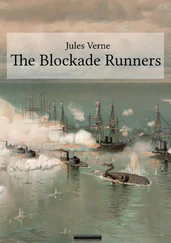“Now what?” replied Shandon in an impatient tone.
“Since the arrival of the second letter I have modified that opinion.”
“Why, doctor?”
“Because the letter tells you the route to follow, but leaves you ignorant of the Forward’s destination; and we must know where we are going to. How the deuce are you to get a letter now we are out at sea? On the coast of Greenland the service of the post must leave much to wish for. I believe that our gentleman is waiting for us in some Danish settlement—at Holsteinborg or Uppernawik; he has evidently gone there to complete his cargo of sealskins, buy his sledges and dog, and, in short, get together all the tackle wanted for a voyage in the Arctic Seas. I shouldn’t be at all surprised to see him come out of his cabin one of these fine mornings and begin commanding the ship in anything but a supernatural way.”
“It’s possible,” answered Shandon drily; “but in the meantime the wind is getting up, and I can’t risk my gallant sails in such weather.”
Shandon left the doctor and gave the order to reef the topsails.
“He takes it to heart,” said the doctor to the boatswain.
“Yes,” answered the latter, “and it’s a great pity, for you may be right, Mr. Clawbonny.”
In the evening of Saturday the Forward doubled the Mull of Galloway, whose lighthouse shone to the northeast; during the night they left the Mull of Cantyre to the north, and Cape Fair, on the coast of Ireland, to the east. Towards three o’clock in the morning, the brig, leaving Rathlin Island on her starboard side, disembogued by the Northern Channel into the ocean. It was Sunday, the 8th of April, and the doctor read some chapters of the Bible to the assembled seamen. The wind then became a perfect hurricane, and tended to throw the brig on to the Irish coast; she pitched, and rolled, and tossed, and if the doctor was not seasick it was because he would not be, for nothing was easier. At noon Cape Malinhead disappeared towards the south; it was the last European ground that these bold sailors were to perceive, and more than one watched it out of sight, destined never to see it again. They were then in 55 degrees 57 minutes latitude and 7 degrees 40 minutes longitude by the Greenwich meridian.
The storm spent itself out about nine o’clock in the evening; the Forward , like a good sailor, maintained her route northwest. She showed by her behaviour during the day what her sailing capacities were, and as the Liverpool connoisseurs had remarked, she was above all, a sailing vessel. During the following days the Forward gained the northwest with rapidity; the wind veered round south, and the sea had a tremendous swell on; the brig was then going along under full sail. Some petrels and puffins came sailing over the poop; the doctor skilfully shot one of the latter, and it fell, fortunately, on the deck. The harpooner, Simpson, picked it up and brought it to its owner.
“Nasty game that, Mr. Clawbonny,” he said.
“It will make an excellent meal, on the contrary,” said the doctor.
“You don’t mean to say you are going to eat that thing?”
“And so are you, old fellow,” said the doctor, laughing.
“Poh!” replied Simpson, “but it’s oily and rancid, like all other sea birds.”
“Never mind!” answered the doctor, “I have a peculiar way of cooking that game, and if you recognise it for a sea bird I’ll consent never to kill another in my life.”
“Do you know how to cook, then?”
“A savant ought to know how to do a little of everything.”
“You’d better take care, Simpson,” said the boatswain; “the doctor’s a clever man, and he’ll make you take this puffin for a grouse.”
The fact is that the doctor was quite right about his fowl; he took off all the fat, which all lies under the skin, principally on the thighs, and with it disappeared the rancidity and taste of fish which is so disagreeable in a sea bird. Thus prepared the puffin was declared excellent, and Simpson acknowledged it the first.
During the late storm Richard Shandon had been able to judge of the qualities of his crew; he had watched each man narrowly, and knew how much each was to be depended upon.
James Wall was devoted to Richard, understood quickly and executed well, but he might fail in initiative; he placed him in the third rank. Johnson was used to struggle with the sea; he was an old stager in the Arctic Ocean, and had nothing to learn either in audacity or sang-froid . The harpooner, Simpson, and the carpenter, Bell, were sure men, faithful to duty and discipline. The ice-master, Foker, was an experienced sailor, and, like Johnson, was capable of rendering important service. Of the other sailors Garry and Bolton seemed to be the best; Bolton was a gay and talkative fellow; Garry was thirty-five, with an energetic face, but rather pale and sad-looking. The three sailors, Clifton, Gripper, and Pen, seemed less ardent and resolute; they easily grumbled. Gripper wanted to break his engagement even before the departure of the Forward ; a sort of shame kept him on board. If things went on all right, if there were not too many risks to run, no dangers to encounter, these three men might be depended upon; but they must be well fed, for it might be said that they were led by their stomachs. Although warned beforehand, they grumbled at having to be teetotallers; at their meals they regretted the brandy and gin; it did not, however, make them spare the tea and coffee, which was prodigally given out on board. As to the two engineers, Brunton and Plover, and the stoker, Warren, there had been nothing for them to do as yet, and Shandon could not tell anything about their capabilities.
On the 14th of April the Forward got into the grand current of the Gulf Stream, which, after ascending the eastern coast of America to Newfoundland, inclines to the northeast along the coast of Norway. They were then in 57 degrees 37 minutes latitude by 22 degrees 58 minutes longitude, at two hundred miles from the point of Greenland. The weather grew colder, and the thermometer descended to thirty-two degrees, that is to say to freezing point.
The doctor had not yet begun to wear the garments he destined for the Arctic Seas, but he had donned a sailor’s dress like the rest; he was a queer sight with his top-boots, in which his legs disappeared, his vast oilcloth hat, his jacket and trousers of the same; when drenched with heavy rains or enormous waves the doctor looked like a sort of sea-animal, and was proud of the comparison.
During two days the sea was extremely rough; the wind veered round to the northwest, and delayed the progress of the Forward . From the 14th to the 16th of April the swell was great, but on the Monday there came such a torrent of rain that the sea became calm immediately. Shandon spoke to the doctor about this phenomenon.
“It confirms the curious observations of the whaler Scoresby, who laid it before the Royal Society of Edinburgh, of which I have the honour to be an honorary member. You see that when it rains the waves are not very high, even under the influence of a violent wind, and when the weather is dry the sea is more agitated, even when there is less wind.”
“But how is this phenomenon accounted for?”
“Very simply; it is not accounted for at all.”
Just then the ice-master, who was keeping watch on the crossbars of the topsails, signalled a floating mass on the starboard, at about fifteen miles distance before the wind.
“An iceberg here!” cried the doctor.
Shandon pointed his telescope in the direction indicated, and confirmed the pilot’s announcement.
“That is curious!” said the doctor.
“What! you are astonished at last!” said the commander, laughing.
Читать дальше












